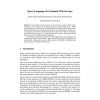Free Online Productivity Tools
i2Speak
i2Symbol
i2OCR
iTex2Img
iWeb2Print
iWeb2Shot
i2Type
iPdf2Split
iPdf2Merge
i2Bopomofo
i2Arabic
i2Style
i2Image
i2PDF
iLatex2Rtf
Sci2ools
121
click to vote
GI
2010
Springer
2010
Springer
Query Languages for Semantic Web Services
: Even though service discovery is one of the vital steps in Web service invocation, service requests are usually expressed by rather simple means. While syntax-based service descriptions are usually addressed using keyword-based queries, Semantic Web Services are queried using "perfect" service descriptions. Hence, a service requester is not able to control the outcome of the discovery process in-depth by specifying similarity ranges or to explicitly state which syntax- and semantic-based parts of a service description should be addressed. In this paper, we present an analysis of current approaches to service request formulation and identify requirements a query formalism for Semantic Web Services should fulfill. Furthermore, we give a brief preview on SWS2QL, a SPARQL-based query language for Semantic Web Services.
Related Content
| Added | 02 Mar 2011 |
| Updated | 02 Mar 2011 |
| Type | Journal |
| Year | 2010 |
| Where | GI |
| Authors | Stefan Schulte 0002, Melanie Siebenhaar, Julian Eckert, Ralf Steinmetz |
Comments (0)

